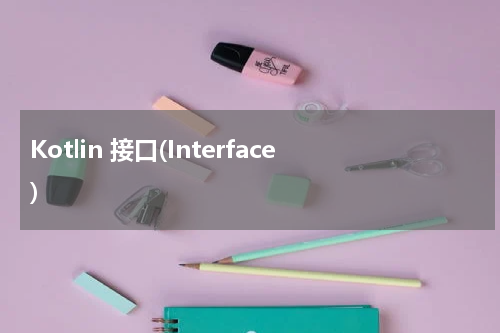
在本文中,您将借助示例学习有关接口以及如何在Kotlin中实现接口的知识。
Kotlin接口类似于Java 8中的接口。它们可以包含抽象方法的定义以及非抽象方法的实现。但是,它们不能包含任何状态。
也就是说,接口可能有属性,但它必须是抽象的或者必须提供访问器实现。
推荐阅读: Kotlin 抽象类
Kotlin中的抽象类与接口相似,但有一个重要区别。抽象类的属性不是必须抽象的或提供访问器实现的。
如何定义接口?
关键字interface用于在Kotlin中定义接口。例如,
interface MyInterface {
var test: String //抽象属性
fun foo() //抽象方法
fun hello() = "Hello there" //具有默认实现的方法
}这里,
创建接口 MyInterface。
该接口有一个抽象属性 test 和一个抽象方法 foo()。
该接口还具有非抽象方法 hello()。
如何实现接口?
这是类或对象如何实现接口的方法:
interface MyInterface {
val test: Int //抽象属性
fun foo() : String //抽象方法(返回字符串)
fun hello() { //具有默认实现的方法
// body (optional)
}
}
class InterfaceImp : MyInterface {
override val test: Int = 25
override fun foo() = "Lol"
//其他代码
}在这里,InterfaceImp 类实现了 MyInterface 接口。
该类重写接口的抽象成员(test属性 和 foo()方法)。
示例:接口如何工作?
interface MyInterface {
val test: Int
fun foo() : String
fun hello() {
println("你好,伙计!")
}
}
class InterfaceImp : MyInterface {
override val test: Int = 25
override fun foo() = "Lol"
}
fun main(args: Array<String>) {
val obj = InterfaceImp()
println("test = ${obj.test}")
print("调用 hello(): ")
obj.hello()
print("调用和打印 foo(): ")
println(obj.foo())
}运行该程序时,输出为:
test = 25 调用 hello(): 你好,伙计! 调用和打印 foo(): Lol
interface MyInterface {
//带实现的属性
val prop: Int
get() = 23
}
class InterfaceImp : MyInterface {
//类主体
}
fun main(args: Array<String>) {
val obj = InterfaceImp()
println(obj.prop)
}运行该程序时,输出为:
23
这里,prop 不是抽象的,但是它在接口中是有效的,因为它提供了访问器的实现。
但是,您不能在接口内部执行类似 val prop:Int = 23 的操作。
在一个类中实现两个或多个接口
Kotlin不允许真正的多重继承。但是,可以在一个类中实现两个或多个接口。例如,
interface A {
fun callMe() {
println("来自接口A")
}
}
interface B {
fun callMeToo() {
println("来自接口B")
}
}
//实现两个接口A和B
class Child: A, B
fun main(args: Array<String>) {
val obj = Child()
obj.callMe()
obj.callMeToo()
}运行该程序时,输出为:
来自接口A 来自接口B
解决重写冲突(多接口)
假设两个接口(A和B)具有相同名称的非抽象方法(假设callMe()方法)。您在一个类中实现了这两个接口(假设C)。 现在,如果使用 C 类的对象调用callMe()方法,则编译器将引发错误。 例如
interface A {
fun callMe() {
println("接口 A")
}
}
interface B {
fun callMe() {
println("接口 B")
}
}
class Child: A, B
fun main(args: Array<String>) {
val obj = Child()
obj.callMe()
}这是抛出的错误:
Error:(14, 1) Kotlin: Class 'C' must override public open fun callMe(): Unit defined in A because it inherits multiple interface methods of it
要解决此问题,您需要提供自己的实现。这是如何做:
interface A {
fun callMe() {
println("接口 A")
}
}
interface B {
fun callMe() {
println("接口 B")
}
}
class C: A, B {
override fun callMe() {
super<A>.callMe()
super<B>.callMe()
}
}
fun main(args: Array<String>) {
val obj = C()
obj.callMe()
}现在,当您运行程序时,输出将是:
接口 A 接口 B
这里,在 C 类中提供了callMe()方法的显式实现。
class C: A, B {
override fun callMe() {
super<A>.callMe()
super<B>.callMe()
}
}语句 super<A>.callMe()调用类A的callMe()方法。类似地,super<B>.callMe()调用类B的callMe()方法。
